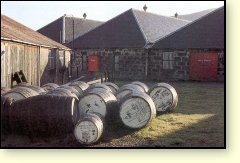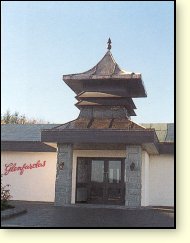
|
      
|
 |
Glenfarclas Distillery

 |
|
Location: Ballindalloch, Speyside AB37 9BD
Roads: Off A95 between Aberlour and Grantown-on-Spey
Hours: 8.30am - 5.00pm, Mon - Fri, also also June - September, Sat, 10am - 4pm; October - March, 10am - 4pm, Mon - Fri
Tours until one hour before stated closing times
Group bookings by appointment.
Reception centre and shop
Phone: 01807-500257
Fax: 01807-500234
|
Text from The Whisky Trails, Copyright © Gordon Brown 1993:
Glenfarclas is one of the supreme Scotch whiskies, the Speyside malt that attracted a lot of attention when someone at a tasting described it as ‘going down singing hymns’. The distillery is still an independent family-run business, there having been five generations of the Grants and all of the males called either John or George. The slopes of Ben Rinnes rise from behind the distillery grounds and in the spring fingers of snowmelt begin to rush downwards; one such runs through the main yard at Glenfarclas.

The visitor's centre at Glenfarclas is topped with its own pagoda head, and the details of the building have an oriental simplicity.
|
Over the years the Grant family have had one or two points of contact with the Royal Family who traditionally spend part of the late summer in this part of the Highlands. The grandfather of the present managing director of the distillery, John Grant, was invited to Balmoral in his time to shoot with King George V, but John Grant’s own Royal contact was a little more painful. During a schooldays game of cricket at Gordonstoun a ball driven by the other side struck him full in the face. The batsman was Prince Charles.
A tenant-farmer called Hay built the distillery in 1836 and the Grants bought it in 1865 when Hay died. John Grant did not himself work the distillery to begin with, however, letting it out for five years to John Smith who then went off to build Cragganmore at Ballindalloch. Grant began distilling in 1870. The Grants, more than most in the Scotch whisky world at the time, were directly affected by the bankruptcy of the Pattison firm in 1898 – the Edinburgh blenders were the Grants’ partners in Glenfarclas! To make matters worse, the distillery had just been rebuilt and there were costs to recoup. By a supreme effort, all creditors were paid and the distillery was secured once again in the family name and the situation has never changed since. The whisky is very highly thought of within the trade and indeed one soliloquy of praise used in promotional literature for Glenfarclas is a direct quote from rival distiller, Tom Dewar, founder of the Dewar’s White Label brand.
A businessman visiting Glenfarclas recently was assailed with an overwhelming sense of déja vu when he walked into the visitor centre after his tour of the distillery. Mystified, he eventually focused on the elegant oak panelling around the walls and when he was told that it had been salvaged from the old passenger liner, the SS Empress of Australia, he realised that he had once travelled to North Africa on board the ship when the panelling was in its original position.
A bonus for visitors at Glenfarclas is being admitted to the store where the whisky casks are filled. It was opened not long ago by Ian McCaskill, the popular BBC weatherman, who ceremonially filled the first cask. ‘As you can see,’ he told those present, ‘the puppet on the TV Spitting Image show is actually better looking than the original.’ The floor maltings closed in 1972 and medium-peated malt is brought in from professional maltsters. The distillery’s location is quite exposed and in winter arrangements are made to be self-sufficient in everything needed for whisky making for up to a month – just in case the snowdrifts lie longer and deeper than usual.
Three pairs of larger-than-average stills, all of them over 20 years old, are fired by an external gas flame; quite rare these days.
In bygone days, the Ballindalloch Grants used to fall out regularly with the Carron Grants next door. What is now Glenfarclas was on the front line and it is still possible to discern the no man’s land strip running up the flank of Ben Rinnes at the edge of the distillery’s property. Realising the unclaimed status of the narrow ribbon of land, some canny crofters built cottages on it and moved in. No landlord, no rent!
During the summer months, vintage car rallies make the distillery one of the check-in points.
The Whisky
Text from The Whisky Trails, Copyright © Gordon Brown 1993:
Glenfarclas is rich and round, sherried, concentrated and zesty. Smoke and vanilla from the oak flash through here and there and the whole is immensely well mellowed. It is issued in a wide range of editions by the proprietors themselves giving a spectrum of how the whisky develops from 10 to 25 years old. The ‘105’ is cask strength, 60% vol., and claimed to be the strongest whisky on the market. This is how Scotch malt used to be drunk – straight from the cask.
Glenfarclas used to be produced in conventional and ‘clear’ versions, the former with a sherrywood emphasis, the latter from Bourbon wood only. Now all Glenfarclas spirit is aged in at least 80 % sherrywood at the distillery and, so that it may be a wholly consistent style, none is released for private bottling as a self whisky. Some slip through the net, however, and an 11-year-old was recently available from one of the independents. One experiment that was kept strictly in-house was the Glenfarclas aged in a port pipe. Delicious, reported John Grant, but it could not really be described as Scotch whisky. Glenfarclas is widely used for blending but the brand names are confidential.
Source of water
Ben Rinnes Spring
|
|  |
 |
|